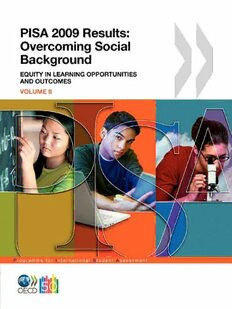
PISA 2009 Results: Overcoming Social Background: Equity in Learning Opportunities and Outcomes (Volume II) PDF
224 Pages·2010·6.91 MB·English
Most books are stored in the elastic cloud where traffic is expensive. For this reason, we have a limit on daily download.
Preview PISA 2009 Results: Overcoming Social Background: Equity in Learning Opportunities and Outcomes (Volume II)
Description:
Volume II of PISA's 2009 results looks at how successful education systems moderate the impact of social background and immigrant status on student and school performance. The volume opens with an introduction to PISA and a Reader's Guide providing information that will help readers understand the data. Chapter 1 focuses on the magnitude of differences in student performance across countries and the extent to which these differences relate to socio-economic background. Chapter 2 examines the extent to which students and schools with different socio-economic backgrounds have access to similar educational resources, and the impact of background and school on learning outcomes. Chapter 3 examines the relationship between student performance and different aspects of socio-economic background. Chapter 4 compares the performance of students with an immigrant background with the performance of other students. Chapter 5 analyses the impact of socio-economic background of schools on reading performance. The final chapter examines policy implications of the findings. Annexes provide detailed statistical data and technical information.Table of Content :Executive SummaryIntroduction to PISAReader's GuideChapter 1. Moderating the Impact of Socio-Economic Background on Educational Outcomes-Interpreting gaps and dispersion in student performance-Family and socio-economic background-Socio-economic background, underlying social and economic inequality and mean performance at the level of the education system-Looking aheadChapter 2. Three Perspectives on Educational Equity and Equality-Equality in learning outcomes-Equity in the distribution of educational resources-Equity in learning regardless of student backgroundChapter 3. Learning Outcomes and Socio-Economic Background-Students' socio-economic and cultural status and performance-The socio-economic gradient: an approach to equity in PISA-A comparative perspective on socio-economic gradients-Student resilience in PISA: the proportion of disadvantaged students who succeed in PISAChapter 4. Learning Outcomes of Students with an Immigrant Background-Students with an immigrant background-The size of the immigrant background student population and mean performance of the system-Performance gaps across immigrant status-First-generation students and age of arrival-Immigrant status and home language-Performance, immigrant status and country of origin-Immigrant status and school resourcesChapter 5. School Systems and the Impact of Socio-Economic Background-The relationshiop between performance and socio-economic background-Performance differences within and between schools-Differences in the socio-economic background of students and schools-Performance differences and the socio-economic background of students and schools-Predicted and actual performance of students in different socio-economic contexts-Performance, socio-economic background and the role of parents-Performance, socio-economic background and participation in pre-primary educationPolicy Implications-Patterns in the relationship between performance and socio-economic background-A disproportionate number of low-performing students-Different slopes and strengths of socio-economic gradients-Different socio-economic profiles-Differing gradients across schools-Differing gradients within schoolsReferencesAnnex A. Technical BackgroundAnnex B. Tables of ResultsAnnex C. The Development and Implementation of PISA - A Collaborative Effort
See more
The list of books you might like
Most books are stored in the elastic cloud where traffic is expensive. For this reason, we have a limit on daily download.
